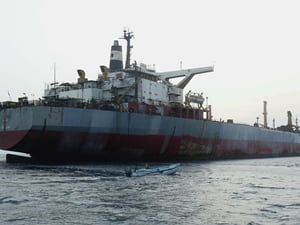At least four tankers carrying diesel and jet fuel from the Middle East and India to Europe are taking a longer route around Africa to avoid the Red Sea, ship tracking data shows.
Diversions around the Cape of Good Hope could extend tankers’ journeys to Europe by up to three weeks, leading to higher freight costs and potentially supply disruption.
But some charterers, including BP (BP.L), have diverted their ships following attacks by the Houthis in Yemen, while others continue to use the shorter Red Sea route via the Suez Canal.
Tankers began avoiding the Red Sea earlier this month after the Houthi militant group stepped up naval attacks on commercial ships in response to Israel’s military offensive in the Gaza Strip.
Container shipping firms including Maersk and CMA CGM announced they would return to the route after the US announced the establishment of a maritime task force aimed at protecting commercial ships.
However, others, including Hapag Lloyd, think the risk is still too great and there is uncertainty about the effectiveness of the US-led operation, which has so far struggled to win the support of some of its key allies.
The diverted ships loaded their cargo from Bahrain, Kuwait, Saudi Arabia and India and were chartered by Sinopec, Kuwait Petroleum Corporation (KPC), Aramco and Reliance Industries Limited respectively, according to shipping analysis firm Kpler.
Of these countries, only Bahrain was on the list of 12 countries out of a total of 20 countries that would participate in Operation Welfare Guardian, which was announced to the public by the USA. Saudi Arabia – along with the United Arab Emirates – said it had no involvement in the operation.
Speaking to Reuters, KPC said it had not asked oil tankers to avoid the Red Sea.
Many ships continued to use this route, although further diversions of oil cargo occurred as long as shippers or oil companies had doubts about the safety of the Red Sea crossing.
According to Kpler data, at the time of this publication, approximately 4.5 million barrels of petroleum products and approximately 2 million barrels of crude oil are loaded on ships passing through the Red Sea and Suez Canal bound for Europe.
By comparison, the diverted ships Sti Solidarity, Jag Lokesh, Ps Atene and Karimata are carrying a total of 2.4 million barrels of diesel and jet fuel around the Cape of Good Hope.
Not all volume may reach Europe – Ps Atene updated destination from Gibraltar to Maputo, Mozambique on December 28, according to Kpler.
But disruptions in the Red Sea have so far not affected Europe’s fuel prices and refinery margins.
The premium for Northwest European low-sulfur diesel futures over Brent crude futures was 10% lower on 28 December than on 1 December; This suggests diesel is relatively well supplied compared to crude oil, according to Investec head of commodities Callum Macpherson.
The structure of the diesel market also became flat in December; This is another sign that traders do not foresee supply shortages in Europe anytime soon.
Kpler analyst Zameer Yusof said European middle distillate markets could still be sensitive to any disruption due to seasonally low stock levels of both diesel and jet fuel in northwestern Europe and low refinery operating rates after the autumn maintenance period.
He added that suppliers in the region will likely depend on diesel imports from the U.S. Gulf Coast until next year.
Europe’s diesel market was mainly driven by Russian cargoes until the EU embargo on Russian oil products from 5 February this year in light of the war in Ukraine, leaving Europe heavily dependent on the Middle East and Asia to fill its structural product deficit. was provided by.
According to Kpler, more than 90 percent of the 14.3 million barrels of jet fuel Europe imported from other regions this year came from markets east of Suez, while about 58 percent of the 24.4 million barrels of average monthly diesel imports came from markets east of Suez.( 7Sea)
The opinions expressed herein are the author’s and not necessarily those of News2Sea.
#Tankers #bound #Europe #leave #Red #Sea
